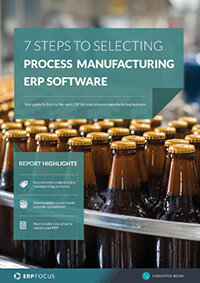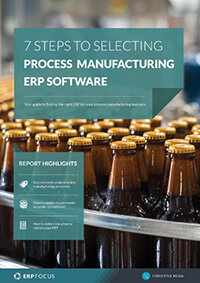Process Manufacturing Requirements: Quality Control
Quality control is important for any business and that certainly includes those in process manufacturing. Even if your particular needs do not fit perfectly with these examples, you should be able to infer how ERP can help you and your business based on the processes outlined below and throughout this document.
Corrective and Preventative Action
Process manufacturers all have production problems to solve at one point or another. One of the first steps to solving said problems is to determine the root cause. How can your process manufacturing ERP help this process?
Your ERP should contain a record of every transaction and data update that occurs in your business. If your business is one that requires corrective action to be rapid and effective, you will need advanced query capabilities to allow you to slice and dice the data. Couple this with real-time reporting, and you may have the tools necessary to work through to the root cause. If preventative action is necessary to stop the problem recurring, your ERP could help control the situation in a number of ways. An example would be the verification of a user’s training through integration with an HRM module - is it up to date and adequate for the transactions they are performing?
Receiving Inspection
Another aspect of quality control your business may wish to manage in your ERP is material inspection management.
Recommended Reading: ERP Manufacturing - 10 Steps to Success
Step one is to identify which materials require an inspection upon receipt. In some businesses like pharmaceuticals, this could be every receipt. Then document a plan defining what measurements to take and where to record the results. This plan could be set up within your ERP and integrated with production scheduling to prevent materials entering the production process before the necessary checks have been carried out. At the same time, the inspectors themselves can be verified to ensure they are qualified to carry out the inspection.
Supplier Management
Supplier management is a vital part of quality control. As a food processor, that chain of supplier quality control must go all the way back to the field or pasture where the materials were grown. You may only require basic data such as supplier name and address which will allow you to submit quality control queries to suppliers. Higher level data such as a record of the suppliers’ certifications and the date of the certifications may also be required so internal certification reports can be produced. Identify your own criteria for supplier quality control and develop a database blueprint which you can use to inform any ERP Request For Proposal (RFP) or ERP demos that you conduct.
Regulatory Compliance
The governmental and industry agencies a business must report to will heavily dictate any quality control requirements analysis for process manufacturing ERP. Whether you are a chemical refiner or produce a line of cosmetics, these requests are the bread and butter of any quality control processes. Fail to meet regulations set out for your industry, and any amount of supplier, inspection and fault management won’t mean a thing. Although aligning these regulations with your ERP requirements may seem like a daunting task, remember that regulatory bodies and industry ERP vendors have done most of the heavy lifting for you. Your job is to play matchmaker between the two.
Free white paper

7 Steps to Selecting Process Manufacturing ERP
Your guide to finding the right ERP software for your process manufacturing business

Related articles
-

Three CRM features to look for in your next manufacturing ERP
ERP CRM modules can be very useful for manufacturers. Here's how to make the most of yours
-

CMMC Compliance: What Aerospace and Defense Manufacturers Need to Know
Key insights on CMMC compliance, deadlines, and securing DoD contracts with CMMC 2.0 certificatio...
-

ERP and quality management
Learn about how ERP software can help you manage quality throughout manufacturing and distribution.

